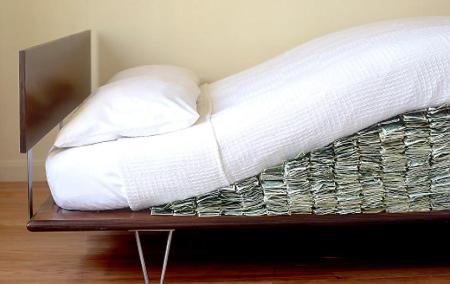One bank with 114 branches in war-torn country; defrauded out of almost all its money; occasional target of terrorists. Ready to bid? That’s what Ashraf Ghani, president of Afghanistan, is hoping. He’s seeking a buyer for Kabul Bank, once the country’s largest. The government took it over in 2010 after its owners were accused of embezzling $825 million using fake loans and spending it on, among other things, 11 villas in Dubai and an airline they used to smuggle cash there. The privatization is a test for Ghani, who wants to show the foreign donors who provide most of his budget that he’s committed to fighting corruption.
New Kabul Bank, as it’s now called, isn’t exactly thriving. The bank has been barred from making loans since the scandal. .. On a recent morning, a branch in Kabul’s Baharistan neighborhood was guarded by five men in military uniforms armed with AK-47 assault rifles. Some of the dust-covered computers weren’t working. A customer trying to make a withdrawal waited for an hour and then was turned away. “I keep hearing about their system failures,” said the customer, Atiqullah Wali. “It’s better to keep our cash inside our pillows like before.”
When the Taliban was driven out of Kabul in 2001, they left the financial system in disarray, fleeing with all but $30,000 of the central bank’s cash. Into the void stepped Sherkhan Farnood, who was wanted by Russian authorities for allegedly running an illegal money-transfer business. He founded Kabul Bank in 2004 and hired Khalil Ferozi as chief executive officer.
The banking industry boomed as foreign aid poured into Afghanistan, with assets expanding by more than 50 percent a year….Farnood amassed property in Dubai and competed in high-stakes poker tournaments in Europe.
The scheme unraveled in 2010, when the central bank learned of the fraud, ordered Farnood and Ferozi to resign and guaranteed the bank’s deposits to stop a run. An investigation by an independent anti-corruption committee commissioned by the Afghan government found that the executives had stolen an amount equivalent to about one-twelfth of the country’s GDP, mainly by giving loans to themselves and their friends that didn’t have to be repaid. One of the alleged beneficiaries was Mahmood Karzai, brother of then-President Hamid Karzai, who wasn’t charged and said he did nothing wrong.
Excerpt from Looted Lender for Sale as Afghanistan Seeks Buyer for Kabul Bank, Bloomberg BusinessWeek, Mar. 4, 2016
